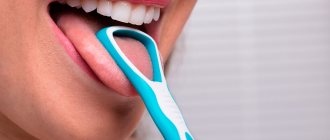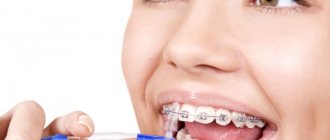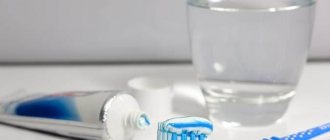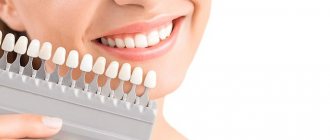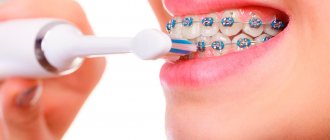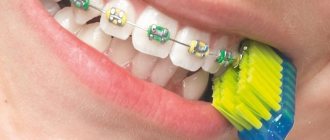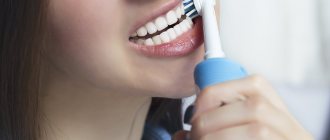Pain when brushing your teeth is common. And often it does not depend on what kind of brush you use - manual or modern electric. In this article we will tell you why teeth can hurt during daily hygiene procedures and what needs to be done in such a situation.
In this article
- It hurts to brush your teeth - what could this mean?
- Why does it hurt to brush healthy teeth if you have hypersensitivity?
- What to do if brushing your teeth hurts?
Why do you need professional teeth cleaning?
Diligent oral care does not exclude the formation of tartar, pigmentation and plaque. Everything that remains on the teeth after hygiene procedures mineralizes over time, forming hard particles. They hold on so tightly that it is not possible to remove them with a thread or brush.
Professional sanitation is carried out using different methods. It is impossible to say for sure which teeth cleaning is better. When choosing a method, the following factors are taken into account:
- oral health;
- the presence of pathological processes;
- contraindications to the use of a particular technique;
- availability of consumables in the clinic.
The importance of the procedure is to prevent the development of the carious process. It is the stone formed on the enamel that damages the bone tissue. This leads to tooth decay. Among other things, the pathology quickly spreads to neighboring units.
Many people are interested in how often to brush their teeth. It is enough to visit the dentist for high-quality oral hygiene twice a year. If you have problems with your gums, it is recommended to make an appointment for cleaning once every 3 months.
What the procedure provides:
- enamel whitening, dark stain removal;
- cleaning from mineralized deposits and dense deposits;
- prevention of caries, inflammatory gum diseases, including you may not need further treatment of periodontitis;
- preparation for complex dental treatment (fixed dental prosthetics, implantation, bite correction);
- eliminating unpleasant odor coming from the mouth.
What to do if brushing your teeth hurts?
The first step is to determine the cause of hypersensitivity with the help of a dentist. If no dental diseases are detected, the doctor will recommend effective ways to combat hypersensitivity.
Here are some tips to help relieve pain at home:
- If possible, eliminate triggers. Eat less sweets and sours, make sure the food is at a comfortable temperature.
- Use a desensitizing paste. The components contained in it dampen hypersensitivity by filling microchannels in dentin. The method of using this paste is different from what we are used to. It is squeezed onto a brush, onto a finger or a piece of cotton wool, after which it is carefully and evenly applied to the surface of sensitive teeth from all sides. The procedure is usually performed before bed; there is no need to rinse your mouth after it so that the active substance penetrates the dentin tissue. The pain when brushing your teeth will become less pronounced or disappear completely after several weeks of regular use of the desensitizing paste.
- Use a fluoride rinse or gel once a day. These agents also reduce sensitivity.
- Choose a toothbrush with soft bristles and do not apply too much pressure. Many people believe that the harder you press on the brush, the better the cleaning result will be. But strong pressure and very hard bristles over time thin the tooth enamel and make the teeth more vulnerable and sensitive to any impact. A brush with soft bristles gently affects even thin enamel, effectively and carefully removes dirt without causing discomfort.
- Take good care of your mouth. One of the causes of hypersensitivity may be poor hygiene. If you brush poorly, bacteria remain on your teeth, plaque and acid form, which irritate your teeth. Therefore, it is important to properly and regularly care for your oral cavity. It is necessary to brush your teeth twice a day with a high-quality brush, clean the interdental spaces with dental floss or an irrigator, remove plaque from the tongue and cheeks, and use a special mouthwash.
All these measures will help reduce tooth sensitivity and improve quality of life.
Sometimes your teeth start to hurt when brushing after a visit to the dentist. Procedures such as bleaching and professional cleaning can increase sensitivity. To avoid this, dentists recommend preparing for the procedure in advance by treating your teeth with a desensitizing paste. And after whitening, you need to follow the dentist’s recommendations for several days. It is not recommended to carry out such procedures more than once a year.
Types and differences of professional teeth cleaning
There are various ways to clean your mouth professionally. Each option has advantages and disadvantages. The choice of technique is made by the dentist.
Ultrasonic
It is performed using a special device - an ultrasonic scaler. The working element of the device is equipped with a nozzle that performs oscillatory movements at an ultrasound frequency of 25-50 kHz. The effect is enhanced by supplying an antiseptic solution or water through the nozzle. Deposits are removed under the influence of cavitation.
This method does not damage the enamel. When treating the oral cavity with an antiseptic, pathogenic bacteria are destroyed. The effectiveness is so high that it is possible to cope even with supra- and subgingival stones. The patient does not feel pain after brushing his teeth.
Laser
Removal of mineral deposits and plaque from the surfaces of the oral cavity is carried out under the influence of a laser beam. The liquid evaporates from them, as a result of which the destruction process begins. Peeled particles are removed with a stream of water supplied under high pressure.
The cost of the service is higher than alternative methods, due to the use of expensive equipment.
Sandblasting
Cleaning is performed using Air Flow equipment. The device even copes with old deposits. The main condition is that the coating must be soft. Air Flow does not remove tartar. The process of sanitation of the mouth involves the use of a special attachment, a mixture containing a fine abrasive, and a fixing gel. This method is used with caution in cases of increased sensitivity of the gums.
Chemical
The essence of the procedure is to apply a special gel containing hydrogen and acid to the teeth. During aging of the product, hard and soft deposits are destroyed under the influence of chemicals.
The method is painless and effective. But the interdental areas are poorly treated.
Mechanical
Sanitation is carried out using brushes and highly active pastes. This method requires more time than alternative options. But the result is high. However, in the process of mechanical impact with brushes, the risk of damage to the enamel increases. For this reason, specialists rarely resort to such cleaning.
Reasons why gums bleed
Blood during brushing indicates problems with the periodontium - the tissues that surround the tooth and hold it in the jaw. Bleeding often occurs in adolescents and pregnant women, which is associated with hormonal changes in the body. As a rule, this goes away over time without consequences. But it is better to visit the dentist during this period so that the problem does not return later.
Basically, gums bleed due to diseases in the periodontal tissues, such as gingivitis, periodontitis and periodontal disease. These diseases are characterized by inflammation of the gums, which progresses over time and can lead to tooth loss. Only timely consultation with a doctor, prevention and treatment of gums will help here.
Bleeding and inflammation of the gums are caused by pathogenic microorganisms that multiply in the mouth due to poor hygiene and bad habits. Bacteria easily enter the gums with food, penetrate the film that protects the periodontium, and cause plaque and tartar. Deposits on the teeth make their way under the gums, expanding the so-called pockets, and the capillaries become thinner. Because of this, even with minor mechanical impact, the tooth bleeds. This is why gums bleed when brushing your teeth.
Contraindications to the procedure
Like any medical procedure, teeth cleaning in a dental clinic has a number of limitations:
- increased sensitivity;
- the presence of erosion processes on the enamel;
- inflammation of the oral mucosa;
- history of arrhythmia;
- epilepsy;
- acute infectious diseases;
- diabetes;
- bronchial asthma, occurring in severe form;
- chronic rhinitis (including runny nose due to ARVI).
Ultrasound and Air Flow services are available to patients over 14 years of age.
What to do if tooth enamel hurts
Sensitivity to external stimuli can be caused by external and internal factors. It is impossible to eliminate the cause of the pain on your own, but you can dull the sensation before going to a specialist. The doctor may prescribe canal cleaning, pulp removal, and therapy with medications, pastes, and solutions. The treatment method is influenced by the reason why the tooth enamel hurts. For temporary correction use:
- pastes to reduce sensitivity;
- anesthetic gels;
- mouth rinse.
Pain is the first sign of a disorder. If you experience discomfort, you should make an appointment with a specialist. Common causes include erasure or damage to the protective layer of disease and inflammation, caries, and increased sensitivity due to an infectious lesion.
As a temporary measure, medications, solutions based on tea tree oil and oak bark are used to rinse the mouth. It is useful to study how coffee affects teeth, how the products are harmful and lead to hyperesthesia.
Stages of the procedure
Professional sanitation of the oral cavity is carried out in stages.
Stage 1: Comprehensive inspection
It is performed using modern instruments to identify deposits and assess the condition of tissues.
Stage 2: removal of soft and hard formations
To obtain high results, two methods are combined: ultrasonic cleaning and Air Flow. The first option destroys the structure of tartar, the second removes plaque and remaining stone.
Stage 3: Polishing
The enamel is polished using special brushes and paste. The surface is smooth and shiny.
Stage 4: fluoridation
To protect bone tissue, a gel or varnish containing a high concentration of fluoride is used.
How do children brush their teeth?
Ultrasonic cleaning and Air Flow are not prescribed for children under 14 years of age. Professional sanitation of the oral cavity is performed using special brushes and paste. After dental treatment, the surface is coated with fluoride-containing gel to strengthen the enamel.
Why you shouldn’t ignore bleeding gums
If you notice that your gums are bleeding and there is pain when brushing your teeth, you should visit the dentist without delaying it. The fact is that gum disease can have disastrous consequences - tooth loss. Gingivitis and periodontal disease develop over a long period of time and do not have an acute phase, but in an advanced state it is completely impossible to cure periodontal disease. According to statistics, in Russia 60% of the population suffers from this disease. It is better to treat gums in the initial stages.
The first symptoms that you should immediately pay attention to are bleeding, swelling and changes in the shade of the gums. Periodontal disease is also accompanied by bad breath. When periodontal disease affects the teeth, teeth may lengthen, roots become visible, teeth become loose and their position changes.
The trigger for contacting a specialist should be the presence of dental plaque, stone and other deposits. By brushing your teeth on time, you can avoid serious damage to your gums. Another obvious symptom of periodontal disease or gingivitis is pain when chewing solid food.
Is it painful to have professional cleaning?
Patients often wonder if it hurts to have their teeth cleaned at the dentist. Regardless of the method used, there is no pain. A feeling of discomfort may occur when removing mineralized formations. In this case, ultrasound is prescribed. Ultrasonic teeth cleaning is also recommended during pregnancy and increased tooth sensitivity.
How to preserve tooth enamel
It is important to know how to care for tooth enamel to prevent the development of pathologies. Experts give advice on how to preserve tooth enamel and not cause deformation. It is necessary to adjust your diet, consume sufficient amounts of protein, calcium, fluoride and vitamin D. It is recommended to reduce sugar consumption and stop smoking.
Dentists recommend giving up the bad habit of chewing pens, pencils, and brushes. Clean daily with a soft brush that does not damage the gums. It is important to remove plaque and food particles using dental floss. Regular visits to the dentist will help prevent the development of hyperesthesia.
If a person has weak protection from nature, then it is possible to undergo a remineralization procedure according to indications. A special composition will protect the surface and reduce sensitivity. Those who regularly experience seasonal manifestations of hyperesthesia are recommended to regularly cleanse with special pastes to instantly reduce sensitivity. A medical specialist may suggest installing veneers not only to correct position and color, but also to reduce pathological sensitivity.
